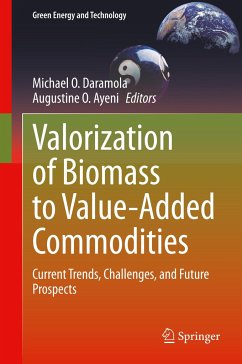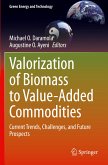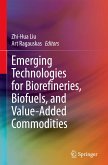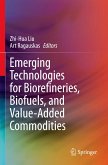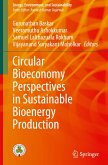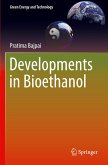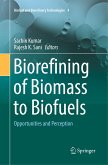Valorization of Biomass to Value-Added Commodities
Current Trends, Challenges, and Future Prospects
Herausgegeben:Daramola, Michael O.; Ayeni, Augustine O.
Valorization of Biomass to Value-Added Commodities
Current Trends, Challenges, and Future Prospects
Herausgegeben:Daramola, Michael O.; Ayeni, Augustine O.
- Gebundenes Buch
- Merkliste
- Auf die Merkliste
- Bewerten Bewerten
- Teilen
- Produkt teilen
- Produkterinnerung
- Produkterinnerung
This book presents the most up-to-date technologies for the transformation of biomass into valuable fuels, chemicals, materials, and products. It provides comprehensive coverage of the characterization and fractionation of various types of biomass and details the many challenges that are currently encountered during this process. Divided into two sections, this book discusses timely topics such as the characterization of biomass feedstock, pretreatment and fractionation of biomass, and describes the process for conversion of biomass to value-added commodities. The authors bring biomass…mehr
Andere Kunden interessierten sich auch für
![Valorization of Biomass to Value-Added Commodities Valorization of Biomass to Value-Added Commodities]() Valorization of Biomass to Value-Added Commodities116,99 €
Valorization of Biomass to Value-Added Commodities116,99 €![Emerging Technologies for Biorefineries, Biofuels, and Value-Added Commodities Emerging Technologies for Biorefineries, Biofuels, and Value-Added Commodities]() Emerging Technologies for Biorefineries, Biofuels, and Value-Added Commodities77,99 €
Emerging Technologies for Biorefineries, Biofuels, and Value-Added Commodities77,99 €![Emerging Technologies for Biorefineries, Biofuels, and Value-Added Commodities Emerging Technologies for Biorefineries, Biofuels, and Value-Added Commodities]() Emerging Technologies for Biorefineries, Biofuels, and Value-Added Commodities77,99 €
Emerging Technologies for Biorefineries, Biofuels, and Value-Added Commodities77,99 €![Circular Bioeconomy Perspectives in Sustainable Bioenergy Production Circular Bioeconomy Perspectives in Sustainable Bioenergy Production]() Circular Bioeconomy Perspectives in Sustainable Bioenergy Production139,99 €
Circular Bioeconomy Perspectives in Sustainable Bioenergy Production139,99 €![Developments in Bioethanol Developments in Bioethanol]() Pratima BajpaiDevelopments in Bioethanol100,99 €
Pratima BajpaiDevelopments in Bioethanol100,99 €![Developments in Bioethanol Developments in Bioethanol]() Pratima BajpaiDevelopments in Bioethanol100,99 €
Pratima BajpaiDevelopments in Bioethanol100,99 €![Biorefining of Biomass to Biofuels Biorefining of Biomass to Biofuels]() Biorefining of Biomass to Biofuels77,99 €
Biorefining of Biomass to Biofuels77,99 €-
-
-
This book presents the most up-to-date technologies for the transformation of biomass into valuable fuels, chemicals, materials, and products. It provides comprehensive coverage of the characterization and fractionation of various types of biomass and details the many challenges that are currently encountered during this process. Divided into two sections, this book discusses timely topics such as the characterization of biomass feedstock, pretreatment and fractionation of biomass, and describes the process for conversion of biomass to value-added commodities. The authors bring biomass transformational strategies that are yet to be explored to the forefront, making this innovative book useful for graduate students and researchers in academia, government, and industry.
Produktdetails
- Produktdetails
- Green Energy and Technology
- Verlag: Springer / Springer International Publishing / Springer, Berlin
- Artikelnr. des Verlages: 978-3-030-38031-1
- 1st edition 2020
- Seitenzahl: 612
- Erscheinungstermin: 22. April 2020
- Englisch
- Abmessung: 241mm x 160mm x 39mm
- Gewicht: 1062g
- ISBN-13: 9783030380311
- ISBN-10: 3030380319
- Artikelnr.: 58290453
- Herstellerkennzeichnung Die Herstellerinformationen sind derzeit nicht verfügbar.
- Green Energy and Technology
- Verlag: Springer / Springer International Publishing / Springer, Berlin
- Artikelnr. des Verlages: 978-3-030-38031-1
- 1st edition 2020
- Seitenzahl: 612
- Erscheinungstermin: 22. April 2020
- Englisch
- Abmessung: 241mm x 160mm x 39mm
- Gewicht: 1062g
- ISBN-13: 9783030380311
- ISBN-10: 3030380319
- Artikelnr.: 58290453
- Herstellerkennzeichnung Die Herstellerinformationen sind derzeit nicht verfügbar.
Dr Michael Daramola is an Associate Professor of Chemical Engineering at the School of Chemical and Metallurgical Engineering, University of the Witwatersrand, South Africa. He is a chartered Chemical Engineer (C.Eng.) with Engineering Council of UK, a Registered Engineer with Council for Regulation of Engineering in Nigeria, and a C-rated researcher by the National Research Foundation (NRF) South Africa. He has more than 14 years of teaching and research experience in academia and research institutes nationally and internationally (e.g. in Nigeria, The Netherlands, France; Singapore, South Africa). His research interest is within chemical and biochemical engineering, but with main activities in nanomaterials and bioresource engineering. He has authored/co-authored more than 90 scientific journal articles; produced 2 patents; authored/co-authored 46 referred conference proceedings, 10 book chapters, 2 edited books; and made more than 60 oral/poster presentations at national and international conferences as contributions to the above-mentioned research domain. He has trained more than 25 postgraduate students (PhD and MSc) and 5 postdoctoral fellows within the research area. He has served on the editorial board of International Journal of Oil, Gas & Coal Technology (IJOGCT) and Modern Research in Catalysis (MRC). Currently, he serves as an Associate Editor of the Chemical Engineering Communications (CEC) and an Associate Editorial Board Member of the Open Chemical Engineering Journal. Dr. Augustine Omoniyi Ayeni graduated from Obafemi Awolowo University, Ile - Ife, Osun State, Nigeria with a Second Class Honours division in Chemical Engineering in 1997. He proceeded to the University of Lagos, Lagos, Nigeria where he obtained his MSc in Chemical Engineering in 2002. He obtained his PhD degree (Chemical Engineering) from Covenant University, Ota, Nigeria in 2013. He is currently a Senior Lecturer and the Acting Head, Department of Chemical Engineering, Covenant University, Ota, Nigeria. Among his academic achievements is the award of PhD research grant of Chief S.L. Edu memorial research grant 2008 sponsored by the Chevron Oil Nigeria in association with Nigerian Conservation Foundation, Lekki, Ajah, Lagos. He was also awarded an Advanced Research and Training fellowship 2009 by the Academy of Sciences for the Developing World (TWAS). This gave him a research stay at the National Environmental Engineering Research Institute, Environmental Biotechnology Division, Nagpur, India from 2010 -2011. He is a Task Team member of the science plan (Sustainable Energy) of International Council for Scientific Union - Region of Africa (ICSU-ROA) based in Pretoria, South Africa. He is a member of the Nigerian Society of Engineers as well as South African Institute of Chemical Engineers. He is a Registered Engineer (COREN: R.26927). He was awarded a Postdoctoral Research Fellowship tenable at the University of Witwatersrand, School of Chemical and Metallurgical Engineering, Johannesburg, South Africa (2015-2017). He is a frequent reviewer for many high-impact scientific journals. He has also reviewed for National Research Foundation (NRF) of South Africa.
Part 1. Characterization of biomass feedstock.- Chapter 1. Application and characterization of lignocellulosic biomass.- Chapter 2. A Short Overview of Analytical Techniques in Biomass Feedstock Characterization.- Chapter 3. Compositional Analysis of Zimbabwean Sugarcane Bagasse Ash towards Production of Nano Silicon for Solar Cell Application.- Chapter 4. Application of artificial Intelligence in the prediction of the thermal properties of biomass.- Chapter 5. Thermochemical Characterization of Biomass Residues and Wastes for Bioenergy.- Chapter 6. Evaluation of Methods suitable for the Analysis of Untreated and Processed Lignocellulosic Biomasses.- Part 2. Pretreatment and processes for conversion of biomass to value-added commodities.- Chapter 7. Biological and Non-Biological Methods for Lignocellulosic Biomass Deconstruction.- Chapter 8. Lignocellulosic pre-treatment methods for bioethanol production .- Chapter 9. Extraction of Multiple Value-added Compounds from Agricultural Biomass Waste: A Review.- Chapter 10. Conversion of Lignocellulosic Biomass to Fuels and Value-added Chemicals Using Emerging Technologies and State-of-the-art Density Functional Theory Simulations Approach.- Chapter 11. Production and Processing of the Enzymes from Lignocellulosic Biomass .- Chapter 12. Sustainable Production of Polyhydroxyalkanoates (PHA) using Biomass-Based Growth Substrates.- Chapter 13. Production and applications of pyrolytic oil and char from lignocellulosic residual biomass.- Chapter 14. An investigation into the potential of maggot oil as a feedstock for biodiesel production.- Chapter 15. Biomass Conversion by Pyrolysis Technology .- Chapter 16. Pyro-gasification of Invasive Plants to Syngas.- Chapter 17. Valorisation of human excreta for recovery of energy and high-value products: a mini-review.- Chapter 18. Butanol as a drop-in fuel: A perspective on production methods and current status.- Chapter 19. Biochar as an adsorbent: A short overview.- Chapter 20. Development of Plastic Composite Using Waste Sawdust, Rice Husk and Bamboo in the Polystyrene Based Resin (PBR) Matrix at Ambient Conditions.- Chapter 21. Development of an integrated process for production and recovery of some selected bioproducts from lignocellulosic materials .- Chapter 22. Separation of Carboxylic Acids: Conventional and Intensified Processes and Effects of Process Engineering Parameters.- Chapter 23. Advances in Engineering Strategies for Enhanced Production of Lipid in Rhodosporidium sp. from Lignocellulosics and other Carbon Sources .- Chapter 24. Application of Lifecycle Concepts in the Conversion of Biomass to Value Added Commodities.- Chapter 25. Sustainable Production of Value Added Commodities from Biomass Feedstocks.
Part 1. Characterization of biomass feedstock.- Chapter 1. Application and characterization of lignocellulosic biomass.- Chapter 2. A Short Overview of Analytical Techniques in Biomass Feedstock Characterization.- Chapter 3. Compositional Analysis of Zimbabwean Sugarcane Bagasse Ash towards Production of Nano Silicon for Solar Cell Application.- Chapter 4. Application of artificial Intelligence in the prediction of the thermal properties of biomass.- Chapter 5. Thermochemical Characterization of Biomass Residues and Wastes for Bioenergy.- Chapter 6. Evaluation of Methods suitable for the Analysis of Untreated and Processed Lignocellulosic Biomasses.- Part 2. Pretreatment and processes for conversion of biomass to value-added commodities.- Chapter 7. Biological and Non-Biological Methods for Lignocellulosic Biomass Deconstruction.- Chapter 8. Lignocellulosic pre-treatment methods for bioethanol production .- Chapter 9. Extraction of Multiple Value-added Compounds from Agricultural Biomass Waste: A Review.- Chapter 10. Conversion of Lignocellulosic Biomass to Fuels and Value-added Chemicals Using Emerging Technologies and State-of-the-art Density Functional Theory Simulations Approach.- Chapter 11. Production and Processing of the Enzymes from Lignocellulosic Biomass .- Chapter 12. Sustainable Production of Polyhydroxyalkanoates (PHA) using Biomass-Based Growth Substrates.- Chapter 13. Production and applications of pyrolytic oil and char from lignocellulosic residual biomass.- Chapter 14. An investigation into the potential of maggot oil as a feedstock for biodiesel production.- Chapter 15. Biomass Conversion by Pyrolysis Technology .- Chapter 16. Pyro-gasification of Invasive Plants to Syngas.- Chapter 17. Valorisation of human excreta for recovery of energy and high-value products: a mini-review.- Chapter 18. Butanol as a drop-in fuel: A perspective on production methods and current status.- Chapter 19. Biochar as an adsorbent: A short overview.- Chapter 20. Development of Plastic Composite Using Waste Sawdust, Rice Husk and Bamboo in the Polystyrene Based Resin (PBR) Matrix at Ambient Conditions.- Chapter 21. Development of an integrated process for production and recovery of some selected bioproducts from lignocellulosic materials .- Chapter 22. Separation of Carboxylic Acids: Conventional and Intensified Processes and Effects of Process Engineering Parameters.- Chapter 23. Advances in Engineering Strategies for Enhanced Production of Lipid in Rhodosporidium sp. from Lignocellulosics and other Carbon Sources .- Chapter 24. Application of Lifecycle Concepts in the Conversion of Biomass to Value Added Commodities.- Chapter 25. Sustainable Production of Value Added Commodities from Biomass Feedstocks.

